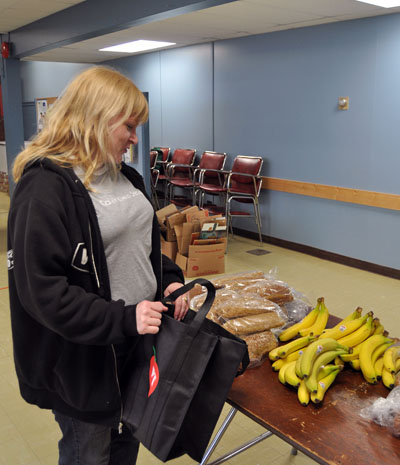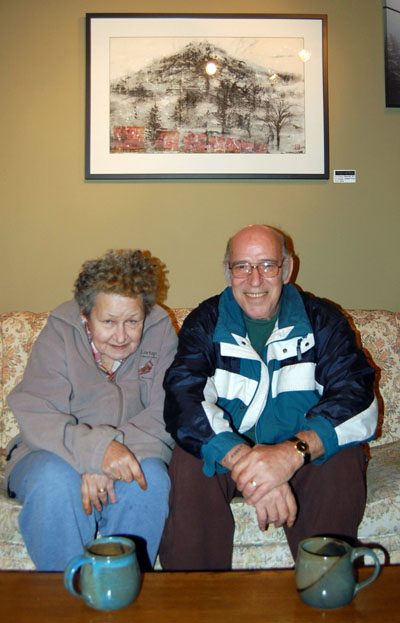
By David F. Rooney
Life is tough enough without having to worry about something as basic as food, but that’s a major concern for people living on the edge — people like single moms and seniors.
“It sucks,” says Jewelles Smith, a single mom with two growing boys.
The 40-year-old has, as she says, “an amazing education — a Master’s Degree in women’s studies,” however, trying to make a living off of that is a tough go. In a good month she might gross $2,500, but most months she makes less than $2,000.
“Our financial situation drives our food situation,” Smith said in an interview. “It forces me to go the Food Bank, which is a little humiliating. Don’t get me wrong, though! I really appreciate the fact that we have one. Does it make me feel inadequate? It does, it does. I wouldn’t use it if I didn’t have children. I’d rather go hungry. But I’m responsible for these two little guys.”
Her situation is complicated by the fact that both she and her children suffer from a wide variety of food allergies, which makes “going to the Food Bank very challenging,” Smith said.
“Between my sons and I we have about 25 or 30 different allergies” to peanuts, peas and other legumes, tomatoes, oranges and grapefruit and other common foods.
Smith takes advantage of everything she can — the regular milk and bread distribution as well as the hamper. But it doesn’t stretch as far as one might think.
“Basically the food I get from the Food Bank lasts for about a weekend,” she said.
She tries to get around her limitations by holding pot luck dinners with friends. That allows all of them to enjoy social meals with a variety of different foods within the confines of their tight budgets.
“It’s a big part of what I do to get by,” she said, but she knows that the endless scramble to find safe, affordable food has social consequences for her children.
“Lunches are so peer-driven,” Smith said. “And if the boys don’t have the money to buy the ‘right’ lunches, they get ashamed.”
Smith is very aware of the precariousness of her situation. When she was younger she has worked with people surviving on Vancouver’s East Side and she even though she had a role to fulfill she had a fear of becoming homeless herself.
“I’m not bitter. I’m just trying to figure out ways to make things work.”
“I’m not bitter,” she said, “I’m just trying to figure out ways to make things work. I do everything I can to make sure my boys grow up healthy. If all I can do is get healthy food and a quality education for them — I’ll be okay.”
But that — all by itself — can be tough.
Another group with limited options are seniors.
Karen Carter and Roger Bertrand are pretty typical for this group. Both are in their late 60s and are getting by on OAS and disability payments

that together amount to just $1,500 a month. For them, reliance on the Community Connections Food Bank is absolutely necessary.
“We use it pretty much every week,” Carter said, adding that can mean swallowing your pride.
“For people with a lot of pride it can be a step back or down or they think they’re beggars. I know people whose pride won’t let them (go to the Food Bank). But if you’re not making very much money how long can you keep going to work if you don’t have enough to eat? It’s there to help people, it’s not something you live off of — it’s just a supplement. Unfortunately, some people can’t look at it that way.”
Both of these seniors also volunteer at the Food Bank. In fact, until his back gave out Bertrand use to deliver hampers to shut-ins who were incapable or getting to the Food Bank themselves.
“What hurt to see was that they’d have family here in town but they were left on their own.”
“Mostly they were women, single and mostly past their 60s,” he said. “What hurt to see was that they’d have family here in town but they were left on their own. Things like that upset me greatly.”
The men and women who volunteer at the Food Bank on a regular basis are “pretty amazing people,” Carter said.
“I have no family so the Food Bank has become like a family to us,” she said.
But even so the agency has significant problems and barriers. Cash donations are down about 30 per cent from last year and a dearth of major food drives have kept the shelves pretty bare. On top of that, there are some major access issues. The stairs that lead to the basement of the Royal Canadian Legion where the Food is housed are daunting for seniors and others with mobility problems.
Carter said Food bank Coordinator Patti Larson has looked at the cost of installing a chair lift, but at $8,000 that’s rather prohibitive so many seniors may simply go hungry rather risk going up and down the stairs.
It is sometimes said that you can tell a lot about a society from the way it treats its most vulnerable members. As Canadians we often pride ourselves on the strength of our social safety nets. Clearly, though, those nets are only as strong as we keep them. And more surely needs to be done.
You can help the Community Connections Food Bank by donating in person or online with a one-time or an ongoing donation. Please go to http://www.community-connections.ca to learn more.



